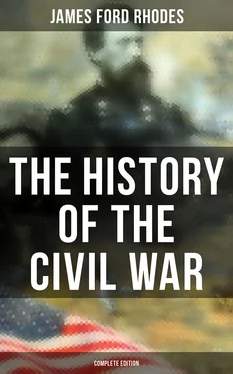James Ford Rhodes
The History of the Civil War
(Complete Edition)
Published by

Books
- Advanced Digital Solutions & High-Quality eBook Formatting -
musaicumbooks@okpublishing.info
2018 OK Publishing
ISBN 978-80-272-4518-5
Table of Contents
CHAPTER I
CHAPTER II
CHAPTER III
CHAPTER IV
CHAPTER V
CHAPTER VI
CHAPTER VII
CHAPTER VIII
CHAPTER IX
CHAPTER X
CHAPTER XI
CHAPTER XII
CHAPTER XIII
CHAPTER XIV
Table of Contents
THE GREAT factor in the destruction of slavery was the election of Abraham Lincoln as President in 1860 1by the Republican party, who had declared against the extension of slavery into the territories. The territories were those divisions of the national domain 2which lacked as yet the necessary qualifications for statehood through insufficient population or certain other impediments; they were under the control of Congress and the President. The Republicans were opposed to any interference with slavery in the States where it already existed, but they demanded freedom for the vast unorganized territory west of the Missouri river. How the election of Lincoln was brought about I have already related at length in my History of the United States from the Compromise of 1850 to the Final Restoration of Home Rule at the South in 1877 3and more briefly in the first of my Oxford Lectures. 4It was a sectional triumph, inasmuch as Lincoln did not receive a single vote in ten out of the eleven States that afterwards seceded and made up the Confederate States. Charleston, South Carolina, an ultra pro-slavery city and eager for secession, rejoiced equally with the Northern cities over the election of Lincoln, but the Charleston crowds were cheering for a Southern confederacy. 5Herein were they supported by the people of South Carolina generally, who saw in the election of Lincoln an attack on their cherished institution of slavery and cared no longer for political union with a people who held them to be living in the daily practice of evil. They regarded their slaves as property and believed that they had the same constitutional right to carry that property into the common territory as the Northern settlers had to take with them their property in horses and mules. Lincoln as President would deny them that privilege; in other words he would refuse them equality. In his speeches he had fastened a stigma upon slavery; believing it wrong, he must oppose it wherever he had the power, and he certainly would limit its extension. Could a free people, they asked, have a more undoubted grievance? Were they not fired by the spirit of 1776 and ought they not to strike before any distinct act of aggression? Revolution was a word on every tongue. The crisis was like one described by Thucydides when "the meaning of words had no longer the same relation to things.… Reckless daring was held to be loyal courage; prudent delay was the excuse of a coward; moderation was the disguise of unmanly weakness.… Frantic energy was the true quality of a man." 6The people of South Carolina amid great enthusiasm demanded almost with one voice that their State secede from the Federal Union. The authorities promptly responded. A Convention duly called and chosen passed an Ordinance of secession which was termed a Declaration of Independence of the State of South Carolina. 7This act, in view of the South Carolinians and of the people of the other cotton States, was based on the State's reserved right "under the compact entitled the Constitution." Martial music, bonfires, pistol firing, fireworks, illuminations, cries of joy and exultation greeted the passage of the Ordinance, which seemed to the people of Charleston to mark the commencement of a revolution as glorious as that of 1776. 8
Meanwhile the United States Senate, through an able and representative committee of thirteen, was at work on a compromise in the spirit of earlier days. In 1820, according to Jefferson, the knell of the Union had been rung; the slavery question, said he, "like a fire-bell in the night awakened and filled me with terror." But then the Missouri Compromise had saved the Union. 9Again, in 1850 when the South and the North were in bitter opposition on the same issue of slavery and threats of dissolution of the Union were freely made by Southern men, the controversy was ended by Clay's Compromise. 10And now in 1860 the people of the Northern and of the border slave States, ardent for the preservation of the Union, believed that Congress could somehow compose the dispute as it had done twice before. The Senate committee of thirteen at once took up the only expedient that could be expected to retain the six remaining cotton States in the Union. 11This was the Crittenden Compromise, called after its author, a senator from Kentucky; and the portion of it on which union or disunion turned was the article regarding territorial slavery. Crittenden proposed as a constitutional amendment that the old Missouri Compromise line of 36° 30´ should serve as the boundary between slavery and freedom in the Territories; north of it slavery should be prohibited, south of it protected. As phrased, the article was satisfactory to the Northern Democratic and border slave State senators, who together made up six of the committee. The two senators from the cotton States would have accepted it, had the understanding been clear that protection to slavery was to apply to all territory acquired in the future south of the Compromise line. The five Republican senators opposed the territorial article, and, as it had been agreed that any report to be binding must have the assent of a majority of these five, they defeated in committee this necessary provision of the Compromise. William H. Seward, 12one of the thirteen, the leader of the Republicans in Congress, and the prospective head of Lincoln's Cabinet, would undoubtedly have assented to this article, could he have secured Lincoln's support. But Lincoln, though ready to compromise every other matter in dispute, was inflexible on the territorial question: that is to say as regarded territory which might be acquired in the future. He could not fail to see that the Territories which were a part of the United States in 1860 were, in Webster's words, dedicated to freedom by "an ordinance of nature" and "the will of God"; and he was willing to give the slaveholders an opportunity to make a political slave State out of New Mexico, which was south of the Missouri Compromise line. 13But he feared that, if a parallel of latitude should be recognized by solemn exactment as the boundary between slavery and freedom, "filibustering for all south of us and making slave States of it would follow in spite of us." "A year will not pass," he wrote further, "till we shall have to take Cuba as a condition upon which they [the cotton States] will stay in the Union." Lincoln, therefore, using the powerful indirect influence of the President-elect, caused the Republican senators to defeat the Crittenden Compromise in the committee, who were thus forced to report that they could not agree upon a plan of adjustment. Then Crittenden proposed to submit his plan to a vote of the people. So strong was the desire to preserve the Union that, had this been done, the majority would probably have been overwhelming in favor of the Compromise; and, although only an informal vote, it would have been an instruction impossible for Congress to resist. Crittenden's resolution looking to such an expression of public sentiment was prevented from coming to a vote in the Senate by the quiet opposition of Republican senators: the last chance of retaining the six cotton States in the Union was gone. 14
Читать дальше













